
On the 1st September the UK Met Office announced “Provisional Met Office statistics confirm that summer 2025 is officially the warmest summer on record for the UK.”
Consistent warmth by day and night, along with several official heatwaves for England, combined with global heating, to give the hottest UK summer since 1884.
“Analysis by Met Office climate scientists has also shown that a summer as hot or hotter than 2025 is now 70 times more likely than it would be in a ‘natural’ climate with no human-caused greenhouse gas emissions. “ MO
The UK’s mean temperature from 1 June to 31 August 2025 was 16.10°C, with the previous record of 15.76°C, set in 2018. It pushes the often talked about ‘summer of 1976’ out of the top five warmest summers ranking.
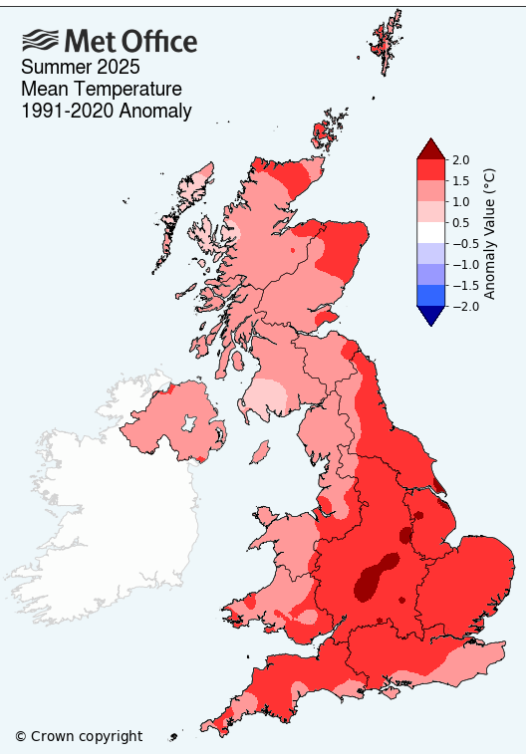
“The persistent warmth this year has been driven by a combination of factors, including the domination of high-pressure systems, unusually warm seas around the UK, and the dry springtime soils. These conditions have created an environment where heat builds quickly and lingers, with both maximum and minimum temperatures considerably above average.” Met Office scientist Dr Emily Carlisle
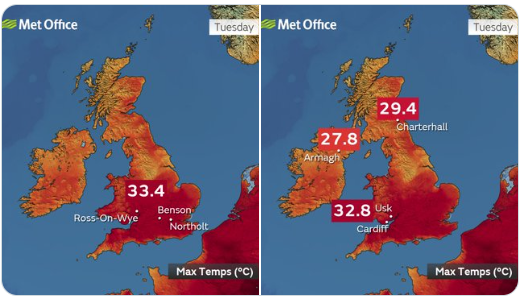
High temperatures around the UK on 12th August
The five warmest UK summers on record are now: 2025, 2018, 2006, 2003 and 2022. The highest UK temperature this summer was 35.8C in Faversham in Kent on the 1st July. The four heatwaves brought discomfort even concern to some people,especially when trying to sleep in large urban areas. The top UK record is 40.3C from July 2022 in Lincolnshire.
“Our analysis suggests that while 2025 has set a new record, we could plausibly experience much hotter summers in our current and near-future climate and shows how what would have been seen as extremes in the past are becoming more common in our changing climate," Head of climate attribution at the Met Office, Dr Mark McCarthy.
The summer months have been dry overall, with droughts declared in some regions of England and water scarcity reaching the top ‘Significant’ level in eastern Scotland. Western Scotland did see decent summer rainfall. Other areas were crying out for rain. Canal levels dropped to unusable levels in central Britain as reservoirs dwindled following a very dry spring for England.
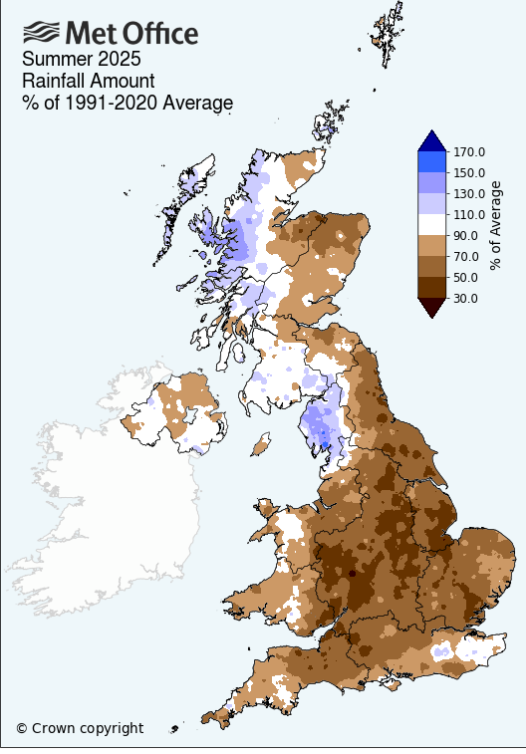
Ireland
Ireland has just seen its warmest summer on record. Following the warmest spring on record for Ireland, Met Éireann has announced that summer 2025 has “provisionally surpassed the summer of 1995 as the warmest on record for Ireland, with an average temperature of 16.19 °C, which is 1.94 °C above Ireland’s long-term average (LTA) and marginally warmer (0.08 °C) than the previous warmest summer of 1995.”
Records stretch back to 1900, and although it hasn’t been a particularly sunny summer, it has been dry with high pressure dominating and warm surrounding seas. This has led to mild nights with consistently warmer-than-average temperatures. This was an important factor, not fierce heat by day but the ongoing warm nights.
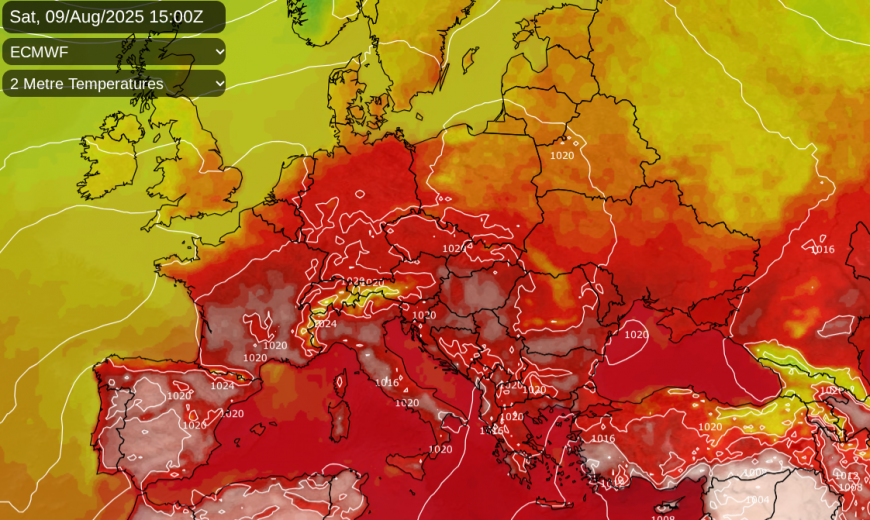
Heat domes to the south and east of Ireland resulted in widespread heatwave conditions across areas of the UK and mainland Europe, and occasional hot spells for Ireland when that hot air pushed northwestwards. A heat dome set up in summer can bring a lengthy hot episode and dangerous heatwaves. An upper high anchors steady weather, often over mainland Europe in summer. With a surface high pressure, there can be hardly any breeze to disturb the hot air, day on day heating from the sun with little cloud cover. The ‘dome’ traps the stable setup with slowly descending air, gradually heating up.
Met Éireann highlights a combination of factors for the warm summer, along with the underlying theme of climate change:
“Dry soils – Following our warmest Spring on record with dry and sunny conditions across the country, soils were very dry. With less evaporative cooling, heat can build and linger for longer.
Heat domes to the south – occasionally pushed hot air masses over Ireland, bringing relatively short hot periods during each summer month.
Marine heatwaves – There was a severe marine heatwave during May 2025, which eased. “Sea Surface Temperatures (SSTs) remained elevated around the coasts of Ireland during the summer. “
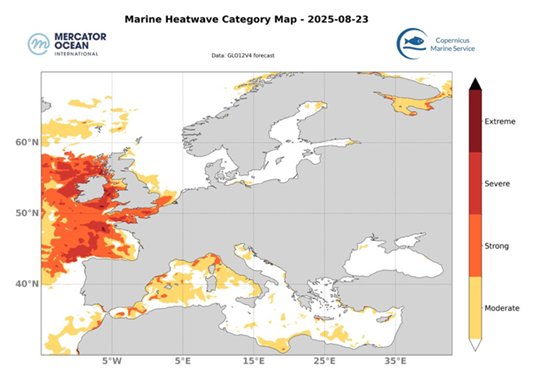
Example of Marine heatwave in August 2025, Copernicus Marine Service. ‘Severe’ and ‘extreme’ sea surface temperatures can be seen on the coasts around Ireland.
“Most Met Éireann observing stations recorded their highest mean minimum temperature for summer on record, and several long-standing stations had their highest number of warm nights on record…The elevated SSTs helped to keep nighttime temperatures higher in general.”
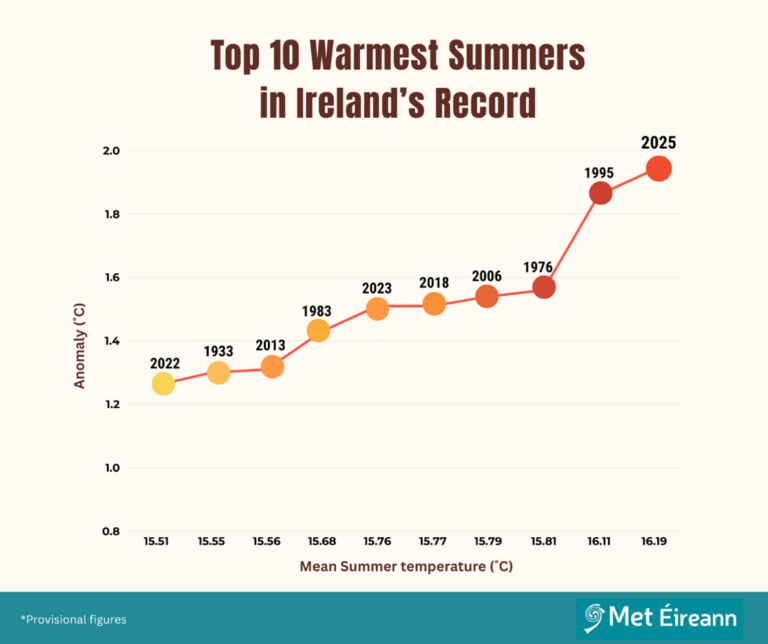
Top 10 warmest summers on record for Ireland, showing the anomaly (°C) with respect to Ireland’s LTA.
Of Ireland’s top 10 warmest summers, six of them have occurred since the 2000s. 1995 and 2025 are the only two summers and seasons to ever surpass an average temperature of 16°C for Ireland.
1995 was a remarkable summer for Ireland, even after a cool start. (June 1995 dragged down the seasonal picture.) It warmed and peaked in August, again with a marine heatwave. There were hot days with temperatures passing 25C even 30C in places. A different pattern to this summer with its steady, consistent warmth.
“The added heat in the system and the continuous background warming due to climate change can now transform an unexceptional season into a record-breaking one. Ireland is experiencing the effects of climate change, and our climate projections show that our climate is going to become warmer. "Met Eireann
Isle of Man
The Isle of Man has experienced its warmest summer on record, according to Ronaldsway Met Office. The mean temperature across June, July and August was 16.0C which are the three summer months for statistical purposes. The mean temperatures include the overnight minimums as well as the daytime maximums. - The previous warmest summer was 1995 with a mean of 15.9C.
Observer Gary Salisbury said that it was the "consistency of the warm periods" rather than extreme peaks that had made the summer of 2025 the warmest since records began in 1948. And many mild nights.
The hottest day of the summer season was the 12th July with 26.7C. It was dry with only 77% of the average rainfall, but the sunshine hours were around average. Eight of the island's top 10 warmest summers have occurred since 2000. This warmest summer for the Isle of Man following the warmest spring on the island.
Mr Salisbury said: "Many will be surprised that the memorable summer of 1976 now slips to ninth place on the list, with a mean of 15.3C."
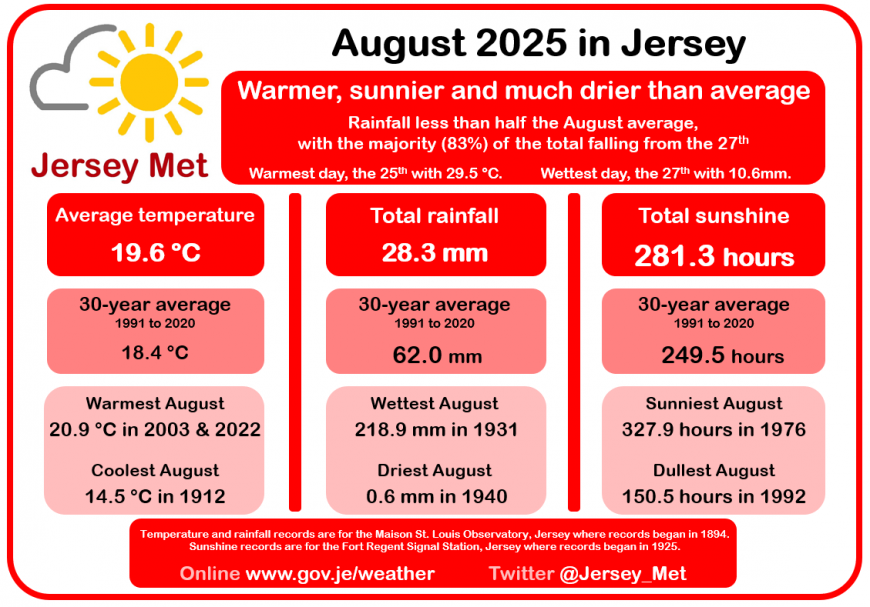
Channel Islands
Jersey saw its 4th warmest summer since records began in 1894. The average summer sea temperature was the 2nd warmest since records began in 1960. Jersey saw its warmest June on record this year, ending with the hottest day of the summer on the 30th June with 33.4C.
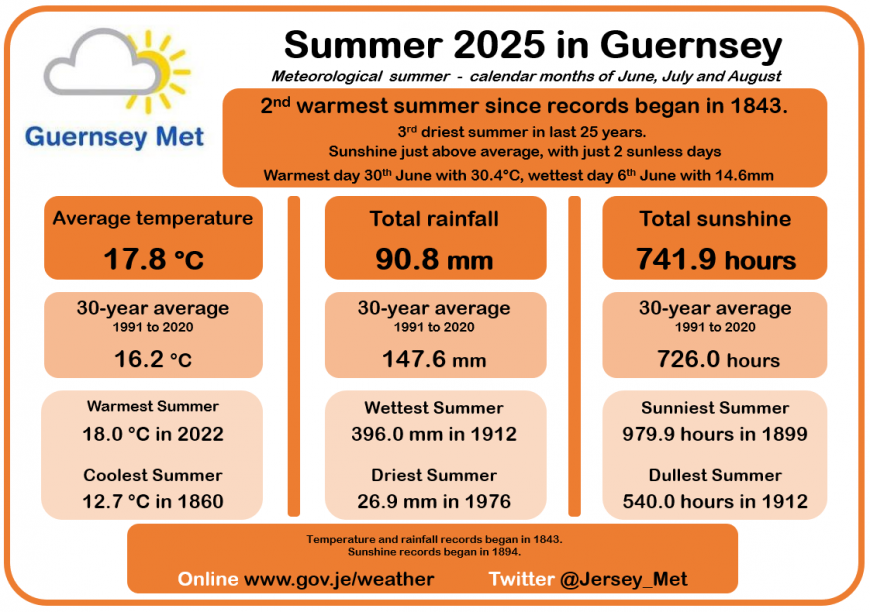
Guernsey saw its 2nd warmest summer since records began in 1843 and the 3rd driest summer in the last 25 years. The warmest day of the summer was also 30th June with 30.4C and it was the next day when this year’s top UK temperature occurred in England.
Loading recent activity...